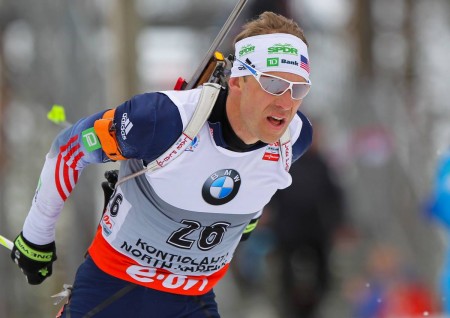The post-Olympic funding announcements have come and gone, and while few sports see an increase at the end of a quadrennial cycle, some are hit harder than others. The U.S. Biathlon Association (USBA) isn’t one of them.
“We ended up being well-supported by the U.S. Olympic Committee,” USBA CEO Max Cobb told FasterSkier. “We didn’t end up getting exactly what we asked for, but the support from them remains really strong. That’s incredibly – it’s very important for us, to continue all of our programs.”
The American national team had a strong season last year, placing three different athletes on the World Cup podium. But nobody feels safe going into funding deliberations, Cobb said, implying that this might be particularly true for smaller sports.
“It’s a huge relief,” he said. “You never know, when a quad comes to an end, how the funding will be for the beginning of the next quad. So we’re incredibly grateful for this partnership with the USOC. We feel really good about how this has just improved every single year.”
USBA also has another trick up its sleeve: the U.S. Biathlon Foundation, a fundraising arm which contributed roughly $90,000 to USBA in 2012 (2013 tax documents are not yet available from Guidestar). USBA is also kicking off the new quad in style with its foundation, which is hosting a golf fundraiser at the end of the month in Ipswich, Massachusetts.
“It wil be hosted by Mark Burton, the chairman of our foundation, and Ray Bourque, one of our foundation trustees,” Cobb said. “Lowell, Tim, Susan, and Hannah are for sure coming, and maybe a couple of other athletes as well. The foundation continues to be a really important part of our overall program, and gives us extra resources we need to be able to run a strong program.”
Cobb, who besides his work at USBA also has a volunteer role as the head of the International Biathlon Union’s Technical Committee, says that he’s had to sink a not insignificant amount of time into getting the foundation going: “from a time management standpoint, it’s a lot of work.” There’s plenty for him to do already at the office without even getting into this new venture – but it’s worth it.
“I think every sport CEO or Executive Director has to devote a lot of time to generating resources,” he said. “I really enjoy all the time I spend with foundation trustees, because they are just super people, and they are very enthusiastic about our team. It’s great to see that. So it has always been fun.”
The USOC recently gave USBA an organizational development grant to hire an assistant, Audrey Chapman, to help with the Foundation work. That, Cobb said, has been another relief and will help the group do even more in the future.
As it stands, a single golf fundraiser like the one to be held in Massachusetts can generate considerable resources for the organization.
“In the past they have raised anywhere from $25,000 to $60,000,” Cobb said.
It’s very hard to predict. It’s a significant amount of our fundraising, for sure.”

Besides the actual money, it’s fostering relationships between donors and athletes that make these events a success, Cobb said, and hopefully one that will extend into the future.
“It’s a nice chance to get people together with the athletes in an environment that isn’t freezing cold, and the athletes are enjoying a beautiful day and a beautiful place and aren’t under any pressure, so it’s very different than meeting up at a World Cup,” he explained. “And the nice thing is, it’s a chance for us to bring people from outside our circle to meet the athletes and hear about the sport. It’s a good opportunity to spread the word about what we’re doing and perhaps find some more people who want to help support us.”
Between support from USOC and the foundation, Cobb says that USBA will be able to continue its programs unchecked this year and spur further success.
“It will allow us to do the right things with the national team over the course of the next year without any compromised,” he said.
That includes a summer training camp in Scandinavia which will send three athletes to the annual Blink rollerski festival in Norway for the first time, as well as allow the women’s team to train alongside Kaisa Makarainen of Finland, a two-time World Cup overall champion.
“In general, Bernd Eisenbichler and the coaches have tried to put together more opportunities and more side-by-side training with other top athletes from around the world,” he said. “And that has been well-received on both sides. The very positive side is that the Europeans are psyched to train with us as well.”
Chelsea Little
Chelsea Little is FasterSkier's Editor-At-Large. A former racer at Ford Sayre, Dartmouth College and the Craftsbury Green Racing Project, she is a PhD candidate in aquatic ecology in the @Altermatt_lab at Eawag, the Swiss Federal Institute of Aquatic Science and Technology in Zurich, Switzerland. You can follow her on twitter @ChelskiLittle.



